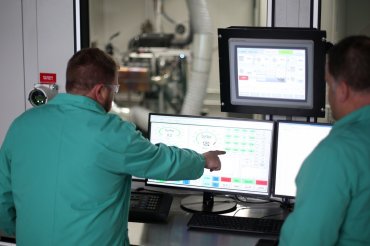Lubricant distributor Lube-Tech opened an expansion of its engine testing facility in Golden Valley, Minnesota, this week. The company uses the facility both for in-house testing and to provide a variety of testing services to outside customers.
Lube-Tech declined to disclose the precise cost of the project, but described it as a multi-million dollar investment.

Photo Courtesy of Lube-Tech
Inside Lube-Tech’s new High-Tech facility. The expanded multi-million dollar facility allows the company to perform third-party contract custom engine testing as well as expand its research and development capabilities.
The facility, named Test-Tech, now contains 13 engine testing stands including: a 60-ton water cooler cell that can be used for outboard marine testing; stands for tests that are part of the Jaso M345 two-stroke engine oil standard; others for hydraulic fluid testing and for shock testing; and stands that can use engines ranging from 1 to 1,500 horsepower for lube and fuel development testing.
The Jaso M345 classification consists of four procedures: the M343-03 test for blocking, the M341-03 detergency test, the M340-03 lubricity and the M342-03 test for smoke generation, each of which the facility is currently running.
Lube-Tech is not currently running any other methods that are part of industry standards but anticipates adding more in the near future if there is demand, Engineering and Engine Manager Denny Swanson told Lube Report.
Test-Tech has been operating for 20 years, but officials said the expansion will allow it to do more contract testing. Contract testing will be performed for customers who need custom engine testing, Swanson said. This is typically a feature we offer to [original equipment manufacturers] and aftermarket engine and parts suppliers who may also need the chemical lab and oil analysis testing. Contract testing can also be utilized for customers who want to run engine testing for durability and performance testing.
Custom tests are specific to customers and are not an industry standard test, necessarily.
With this expansion, we have also increased our testing capacity to include marine, shock and the ability to run with controlled intake air, he added. The new Test-Tech facility provides us with experimental capabilities as well, which will allow our custom solutions offering to increase.
Swanson described the Test-Tech facility as somewhat unique. Every testing provider has a different offering. We are geared to the powersports and outdoor power market, [catering to] both the OEM and aftermarket, he added.
The company estimated it is currently performing 80 percent research and development and 20 percent contract work company-wide, though it anticipates an increase to contract testing with the launch of the new facility.
Demand for engine, drivetrain, lube and performance tests is growing, the company says, meaning capable test facilities are also in demand. Engine testing is a substantial investment that not all OEMs have the capacity to perform when the demand is high, explained Swanson, which is why OEMs outsource such tests.
